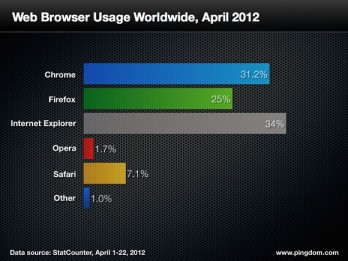Internet Explorer remains the most widely used worldwide, but closely follows the Google browser. Firefox wins in Europe and Africa, but its future is uncertain.
War of the Browsers is ticking. And the last soldier to appear in this contest, Chrome, continues to increase its market share in South America and has undisputed first place: 48% percent of users in the region use the Internet through the Google browser.
According to figures released by Pingdom, Chrome takes him 20 percentage
points to the second most used browser: Internet Explorer, which accounted for 28.9 percent, followed by Mozilla Firefox, adopted by the 20.8 percent of American Internet users.
Pingdom recorded data provided by StatCounter, a web site that displays statistics on the use of the Web, during the first three weeks of April. And it shows that Google’s browser lacks little to attain the world title. Internet Explorer continues to lead across the globe with 34 percent market share, followed closely by Chrome, with 31.2 percent and Firefox, with 25%. The top-five is completed by Safari (7.1%) and Opera (1.7%).
Chrome is also the most widely used in Asia, with 36.4 percent. Meanwhile, Internet Explorer is king in North America, with 40.4 percent of users, and Oceania, with 35.5 percent.
Meanwhile, Firefox leads the European continent with 30.6 percent, but there is a · dead heat “with Internet Explorer (29.2%) and Chrome (29.1%). Also prevails in Africa, where the Microsoft browser accounts for 39.5 percent of users. Something to criticize the study: it is unclear if Central America is in North or South, or if it was not contemplated.
In the world ranking of versions, the first place is for Chrome 18,

News from South America
According to Pingdom, Google has been successful in keeping users up to date, thanks to automatic updates and “silent”, which resulted in a lower dispersion of the versions. This can be seen in the fact that Chrome 17 has 10 times less users that Chrome 18. Instead, Internet Explorer displays more fragmentation.
The site also indicates that the iPhone is becoming increasingly used to navigate and therefore the desktop version of Safari is just ahead of its release for tablets. The iPad generated greater impact in Oceania, North America and Europe.
In conclusion, he warns that the glory days of Internet Explorer have done and will continue losing market share, while Chrome gained more market share. On the future of Firefox, indicates that it is uncertain, because much of the historic market gained Chrome users were “Zorrito”. Will have to see who wins the upcoming battles of the War of the Browsers, which promises to add more pepper in each contest.


